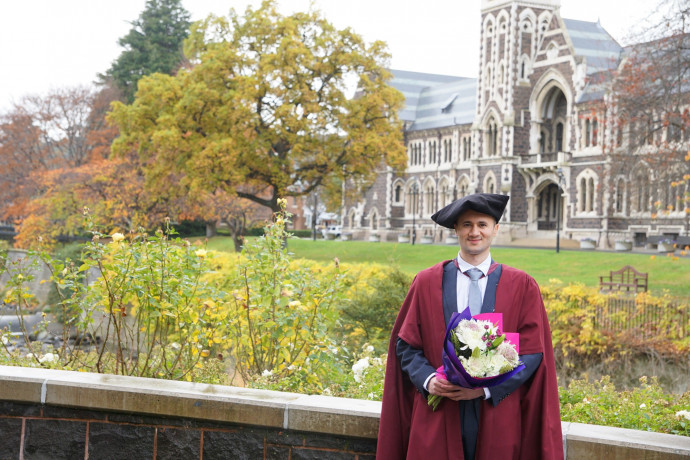2024 Hatherton Award: Pioneering understanding of phase transitions in disordered systems

Dr Ehsan Arabahmadi has been awarded the Hatherton Award by Royal Society Te Apārangi for his work on a new phase transition in disordered systems, directing their experimental investigation. This work is leading the way for the understanding of how in planar-sheet-like systems work.
A phase transition is the physical process in which a medium will change from one medium to another – like that of melting ice to water. These transitions are fundamental to understanding the physical world. Disorder, including impurities and defects, play a crucial role in the conductivity of metals and insulators – but there are unanswered questions in this field, particularly about how in planar-sheet-like (two-dimensional) systems work.
In the paper, ‘Momentum-space signatures of the Anderson transition in a symplectic, two-dimensional, disordered ultracold gas’, where he is lead author, Ehsan addressed some of these crucial questions and identified ways to further investigate them using theoretical and experimental techniques. This work has been described as highly technical in theoretical and computational nature and was published the journal of the American Physical Society.
The paper studied the phenomenon of Anderson localisation – a wave phenomenon that is the result of quantum reflections in the lattice (a geometrical arrangement of points) that make the wave function stop – in a two-dimensional, disordered, spin-orbit coupled system. The key results of the paper are around properties at the metal-insulator transition and related practical signatures, that can be measured in experiments.
The selection committee chose Ehsan and his work for this award because of the impressiveness of his results. They say the calculations, both analytical and computational, are very difficult. They were particularly impressed by the finite-time scaling analysis used, which requires meticulous average over a very large number of disorder configurations. It is expected that this work will receive interest from other theoretical and experimental groups around the world.
Originally from Iran, Ehsan moved to Aotearoa New Zealand to complete his PhD at the University of Otago’s Department of Physics. A nominator explained that during this time, he faced several challenges including the pandemic and being far from his family. “Despite these challenges, he has consistently worked very hard during his PhD and has been a great and collegial member of the Department.”
Ehsan says he is honored and grateful to receive the Hatherton Award.
“This recognition means so much to me, both personally and professionally. I’d like to thank the University of Otago, especially my PhD supervisor, Professor David Hutchinson. His guidance, encouragement, and unwavering support made an incredible difference in my journey. Professor Hutchinson nurtured not only my scientific development but also my confidence, and for that, I am profoundly thankful.”
He says he also wants to extend my gratitude to Dr Daniel Schumayer, who has been an incredible mentor.
“Beyond our technical discussions, Daniel helped me a lot with offering invaluable advice as I navigated life and academia in New Zealand. His kindness and insight made my transition much easier and enriched my experience in ways I will always appreciate.”
Ehsan says arriving in New Zealand was an inspiring experience: “I was fascinated by its beauty, and the rich multiculturalism here, and the kindness I felt from the academic community and beyond made New Zealand feel like a second home. The peaceful and collaborative environment fostered my growth and allowed me to focus on my research.
“Thank you to the Royal Society, my mentors, my colleagues, and my family for this meaningful recognition. I hope to continue contributing to the scientific community with the same dedication and openness that I was so fortunate to experience here in New Zealand.”
Hatherton Award:
For the best paper by a PhD student in the physical, earth, mathematics or information sciences.
Citation:
To Ehsan Arabahmadi for technically challenging theoretical work that sheds light on a novel phase transition in disordered systems and points towards to their experimental investigation.
